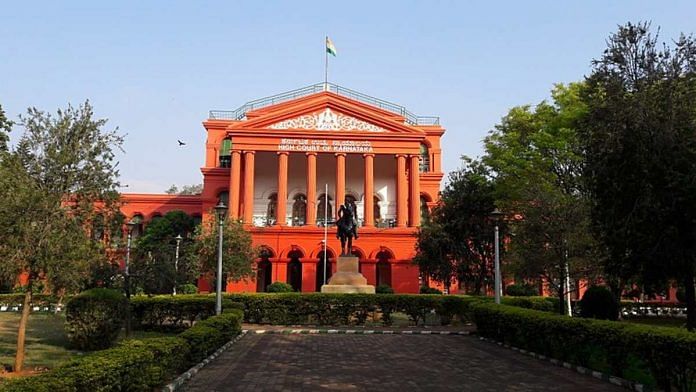New Delhi: The Karnataka High Court has restrained students of colleges that have prescribed a dress code or uniform from wearing “religious garments” and requested the state to reopen educational institutions, so that classes can be commenced at the earliest.
The formal order was uploaded on the Karnataka High Court website Friday morning, a day after the bench indicated its intention to deliver it.
The order, issued by a three-judge bench led by Chief Justice Ritu Raj Awasthi, is an interim order and will be in force till the petitions challenging colleges’ ban on the wearing of hijabs or headscarves by Muslim girl students is decided by the bench.
“Pending consideration of all these petitions, we restrain all the students regardless of their religion or faith from wearing saffron shawls (bhagwa), scarves, hijab, religious flags or the like within the classroom, until further orders,” the seven-page order noted.
There was stiff opposition from the petitioners when the court spoke its mind regarding the interim order Thursday, with some lawyers asserting students were being made to choose between “education and their conscience” and that such a direction would be an “affront to their religious rights”.
The HC order shall be applicable only to institutions where college development committees have prescribed a dress code for students.
Also read: Viral photos, bruised egos, radical student groups: Inside story of Karnataka’s hijab crisis
‘In the interest of students’
The bench, in its order, said the interim directions were “in the interest of students”, which would be “better served by their returning to classes than by the continuation of agitations and consequent closure of institutions”.
“The academic year is coming to an end shortly. We hope and trust that all stakeholders and the public at large shall maintain peace and tranquility,” it further said.
Hearing on the petitions commenced Thursday before a larger bench of three judges comprising Chief Justice Awasthi and justices Krishna S. Dixit and J.M. Khazi. A day earlier, a single-judge bench had referred the matter to the HC chief justice for placing the petitions before a larger bench in view of the seminal constitutional questions raised in the case.
Karnataka has witnessed large-scale protests following the refusal of some educational institutions to allow students to wear the hijab.
The state government stepped in Wednesday to close down educational institutions after protests escalated and threatened to turn violent.
The HC order commented on the ongoing agitation over the issue, remarking the court was “pained” by it as well as the closure of educational institutions, particularly when the matter is under judicial scrutiny and important issues of constitutional significance and personal law are being debated.
‘Not happy things to happen’
The court also touched upon rights not being absolute and said the issue of whether the hijab can be worn in a classroom and is part of essential Islamic practice needs a deeper examination.
“It hardly needs to be mentioned that ours is a country of plural cultures, religions and languages. Being a secular state, it does not identify itself with any religion as its own. Every citizen has the right to profess and practise any faith of choice is true. However, such a right not being absolute is susceptible to reasonable restrictions, as provided by the Constitution of India,” it said.
Closure of colleges, disturbance of peace and tranquility due to the ongoing agitation in the name of religion and culture cannot be permitted, the court said.
“Endless agitations and closure of educational institutions indefinitely are not happy things to happen. Elongation of academic terms would be detrimental to the educational career of students, especially when the timelines for admission to higher studies and courses are mandatory,” the bench said.
(Edited by Saikat Niyogi)
Also read: Will protect constitutional rights, take up plea at ‘appropriate time’, says SC on hijab row



